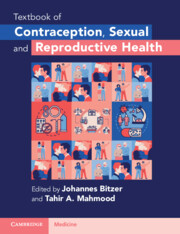Book contents
- Textbook of Contraception, Sexual and Reproductive Health
- Textbook of Contraception, Sexual and Reproductive Health
- Copyright page
- Contents
- About the Authors
- Contributors
- Section 1 Sexual and Reproductive Health and Rights, Public Health Aspects and Prevention in Sexual and Reproductive Healthcare
- Section 2 Sexual and Reproductive Healthcare
- Section 2A Sexual and Reproductive Healthcare: Contraception
- Section 2B Sexual and Reproductive Healthcare: Termination of Pregnancy
- Section 2C Sexual and Reproductive Healthcare: Infertility
- Section 2D Sexually Transmitted Infections
- Chapter 43 Vulvovaginitis
- Chapter 44 Sexually Transmitted Genital Infections
- Chapter 45 Sexually Transmitted Genital Infections
- Section 3 Sexual Healthcare
- Section 4 Sexual and Reproductive Health Indicators and Policies
- Index
- References
Chapter 43 - Vulvovaginitis
from Section 2D - Sexually Transmitted Infections
Published online by Cambridge University Press: 16 January 2024
- Textbook of Contraception, Sexual and Reproductive Health
- Textbook of Contraception, Sexual and Reproductive Health
- Copyright page
- Contents
- About the Authors
- Contributors
- Section 1 Sexual and Reproductive Health and Rights, Public Health Aspects and Prevention in Sexual and Reproductive Healthcare
- Section 2 Sexual and Reproductive Healthcare
- Section 2A Sexual and Reproductive Healthcare: Contraception
- Section 2B Sexual and Reproductive Healthcare: Termination of Pregnancy
- Section 2C Sexual and Reproductive Healthcare: Infertility
- Section 2D Sexually Transmitted Infections
- Chapter 43 Vulvovaginitis
- Chapter 44 Sexually Transmitted Genital Infections
- Chapter 45 Sexually Transmitted Genital Infections
- Section 3 Sexual Healthcare
- Section 4 Sexual and Reproductive Health Indicators and Policies
- Index
- References
Summary
The thickness and health of the squamous epithelium of the vagina is strongly influenced by the presence of oestrogen during puberty, the reproductive period and particularly during pregnancy. At maturation the flaking off of dead cells at the surface and the subsequent release of glycogen from these cells is the power supply of Döderlein lactobacilli, which converts it into lactic acid and creates a low (acid) pH between 4 and 4.5. In children and after the menopause the pH is higher than 4.7, but during the fertile period it falls to less than 4.5 in healthy conditions.
- Type
- Chapter
- Information
- Textbook of Contraception, Sexual and Reproductive Health , pp. 267 - 273Publisher: Cambridge University PressPrint publication year: 2024



